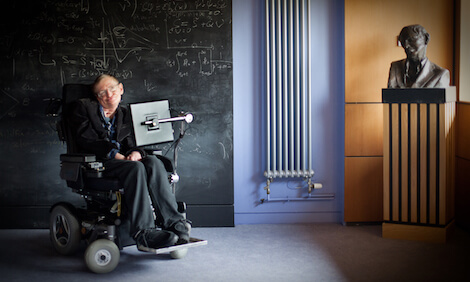


Stephen Hawking held the honored position of Lucasian Professor of Mathematics at the University of Cambridge from 1979 until he retired from the post in 2009.
When you think of great scientists, you may think of Galileo, Newton, or Einstein. Another name that may come to mind is Stephen Hawking, who died on March 14, 2018, at the age of 76. Though disease left him confined to a wheelchair, his mind explored the cosmos. In his work as a theoretical physicist, he tried to answer questions such as “How did the universe begin?” and “What is a black hole really like?”
Stephen Hawking was born in Oxford, England, on January 8, 1942, exactly 300 years to the day after the Italian scientist Galileo died. Hawking’s father was a biologist, while his mother had studied philosophy, politics, and economics. Hawking had three siblings—two sisters and an adopted brother. Considered eccentric, or unusual, by their neighbors, almost every member of the Hawking family shared a great thirst for knowledge. When the family sat down to dinner together, the parents and most of the children would often read books while they ate.
Hawking’s father had hoped Stephen would study medicine, but the boy had other ideas. From a young age, he would spend summer evenings staring up at the stars. He started college early at age 17, studying physics and cosmology. Cosmology is the study of the origin and development of the universe. After earning an undergraduate degree at the University of Oxford, Hawking went on to earn a PhD in cosmology from the University of Cambridge.
At 21, Hawking was diagnosed with amyotrophic lateral sclerosis (ALS). This disease causes the nerves that control the muscles to gradually shut down. Over time, ALS leaves its victims unable to move, eat, swallow, or breathe. Hawking’s doctors predicted that he had only two and a half more years to live. Hawking outlived that prediction by more than 50 years!
Hawking refused to let his body’s growing limitations keep him from using his mind. He dedicated himself to his studies. Among other discoveries, he expanded our understanding of black holes. These collapsed stars were once believed to have such strong gravity fields that nothing, not even light, could escape them. Hawking demonstrated that some matter, in the form of radiation, could escape from a black hole. He showed that this “Hawking radiation,” as it came to be called, could actually cause a black hole to evaporate, or disappear entirely.
Hawking also wrote a number of books to help people who are not professional scientists understand cosmology. A Brief History of Time, probably his most famous book, sold more than 10 million copies. He also wrote a series of books for middle school students on the creation of the universe with his daughter Lucy Hawking.
Hawking taught college courses for decades. He was appointed the Lucasian Professor of Mathematics at Cambridge, a post he held for 30 years. One of the earliest people who held that position was the English mathematician and scientist Sir Isaac Newton. Hawking received many other honors, appeared on several popular TV shows, and lived to see a movie made about his life. The next time you look up in wonder at the stars, remember this great man who helped us understand them better.


























